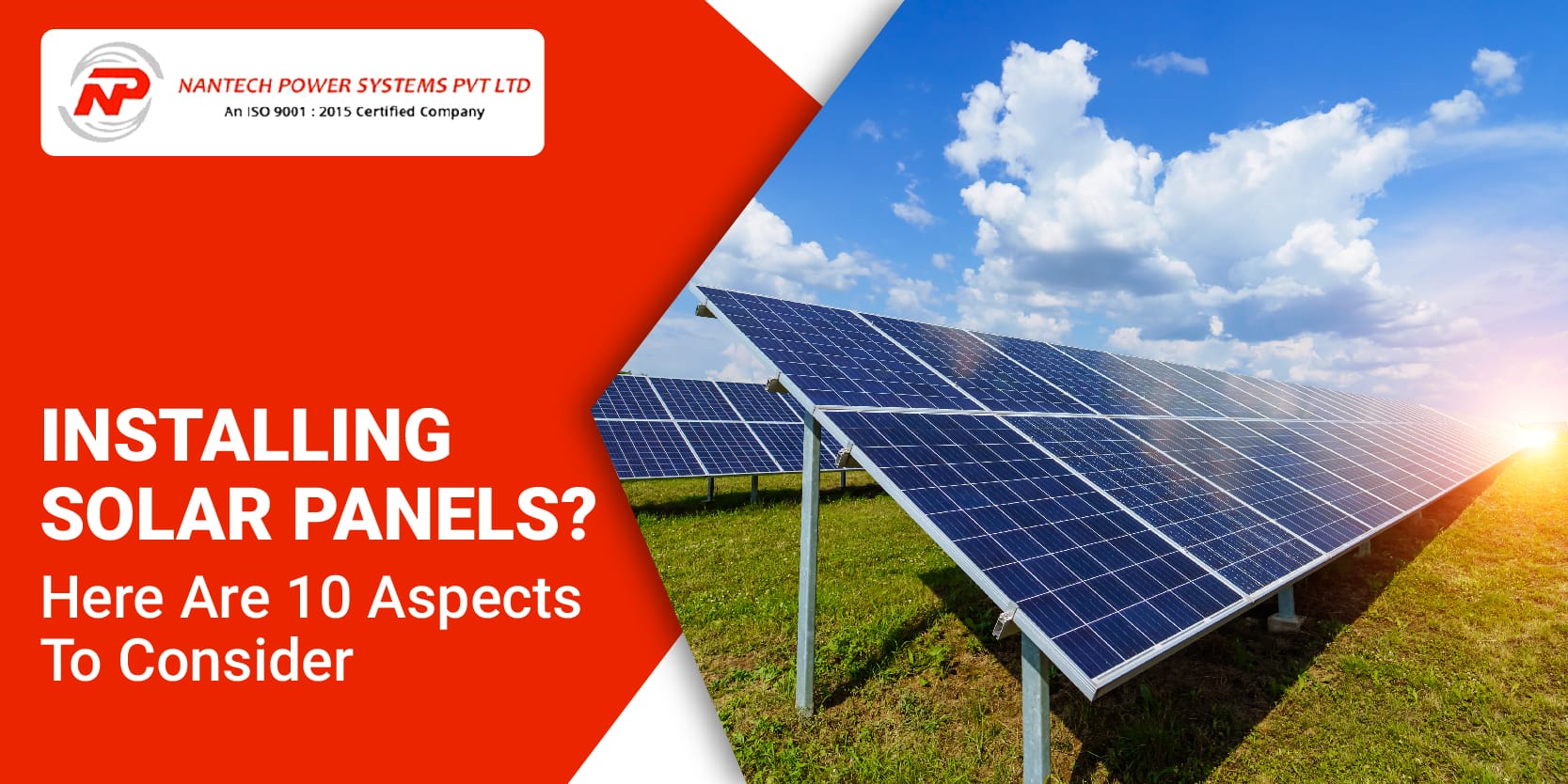- Home
- About us
- Products
- Dealer Enquiry
- Blog
- Contact Us
- Home
- About us
- Products
- Dealer Enquiry
- Contact Us
- 044 -2486 1994
- +91 99623 98222
- sales@nantech.in
- REQUEST A QUOTE

Harnessing the energy of the blazing sun is perhaps the most effective, sustainable, and cost-effective solution to power homes and establishments in India. In Chennai, where the sun beats down mercilessly for much of the year, it could prove a worthwhile investment. Besides, who would say no to a lifetime of sustainable energy?
Over the years, there has been an increased awareness of the importance of renewable energy. Also, as solar energy is seen as the best alternative energy source, people see it as a sensible investment.
It won't take long before you think about buying solar panels to power your home or business. However, like every other purchase, this is an investment that requires careful planning and consideration. To help you make a wise choice, we compiled a list of factors to consider before you bring home your solar panels. Let's take a look.
Condition and layout of your roof
Since your solar panels will be housed on the roof of your building, it is the first thing to come under the scanner. Before you go ahead with the purchase, your roof should be inspected by a professional to assess three aspects:
Depending on the number of panels you require, it can add considerable weight to your roof. Therefore, ensure your roof is in perfect condition and do the required renovations before giving the green signal for the installation.
Property's exposure to sunlight
When evaluating your property before the installation, check if it receives at least four to five hours of direct sunlight. You also need to rule out any sources of shading like trees or buildings that may block the sun from your panels. That said, you should remember that your solar panels will receive photons from the sun even on cloudy days. They do not require blue skies throughout the year, so do not fret!
Amount of energy required.
Your household's energy consumption is determined by the number of family members, electrical devices, usage, and so on. To ascertain the exact number of panels required, you can do the following calculation:
Kilowatts of energy used per day x 0.25 = Number of panels required to produce energy.
Government incentives for solar energy
Solar energy is free and clean energy, and the government provides incentives and subsidies to those wishing to install solar panels. The main objective here is to allow electricity generated from photovoltaics to compete with other energy sources. Apart from India, many other countries provide solar power subsidies to encourage this investment. Therefore, it is crucial to collect all the available information and gain maximum benefits with these incentives.
Choosing the right company for the installation
Solar panel installation is a job for professionals well-versed in similar electrical projects. It is not a DIY project. You will need a reputed installer who will:
It is important to note that certified professionals can only carry out solar panel installation.
Will you lease or buy?
Depending on your finances, you have two options to invest in solar panels:
Whatever the choice, it is a win-win situation as the benefits and profits override the disadvantages.
Connected to the grid or off-grid
Another big decision for installation depends on whether you want to be connected to the grid or run an off-grid system that stores the electricity. Let's break it down for you:
Grid system: Provides you with Net Metering, an incentive that gives you credit on your bill for the excess power produced by your solar panels.
Off-grid system: Not connected to your electricity bill. Hence you need a large storage capacity to save energy and use it when required.
Positioning of your panels
The position of your solar panels has a great impact on the amount of energy generated. For example, if you live in the northern hemisphere, the sun is south of the sky. Hence, if the panels are placed on a south-facing roof, it will allow maximum exposure to the sun's rays. Here are more guidelines for solar panel positioning:
We suggest you seek professional guidance from installation experts to get things done the right way.
Also Read: Understanding The UPS( Uninterruptible Power Supply)
The main objective of installing solar panels is to generate your source of energy and curb electricity expenses. However, it can be tough to calculate how much money you will save. You can use this formula to estimate your saved expenses with solar energy:
Your electricity rate (INR/kWh) + your GST x your solar power system size x 1,168
Go Solar To Save The Earth!
Whether you are saving small or big, you are playing your part in using natural, sustainable energy. Yes, solar panels are a significant investment, but it is one of the best choices you can make.
To ensure that your panels are performance-tested, you should reach out to expert installers like Nantech Power Systems Pvt Ltd. We are Chennai's leading solar panel supplier, experts in installing on-grid, off-grid, and solar-powered street lights. Let's discuss your solar panel requirements and get going with your installation process!
Know How To Buy The Right UPS!
Future of Power Supply in India
Understanding The UPS( Uninterruptible Power Supply)
What To Expect From The Power Industry in 2021?
Modular UPS Versus Conventional UPS: Differences Decoded
Uncovering the Game-Changing Benefits of Modular UPS Systems
Maximising Inverter Battery Performance: Key Factors to Consider
Role of UPS Systems in Critical Industries
Tamil Nadu Solar Power Subsidies: Everything You Need to Know
On-Grid vs. Off-Grid Solar Systems: The Ultimate Decision Guide